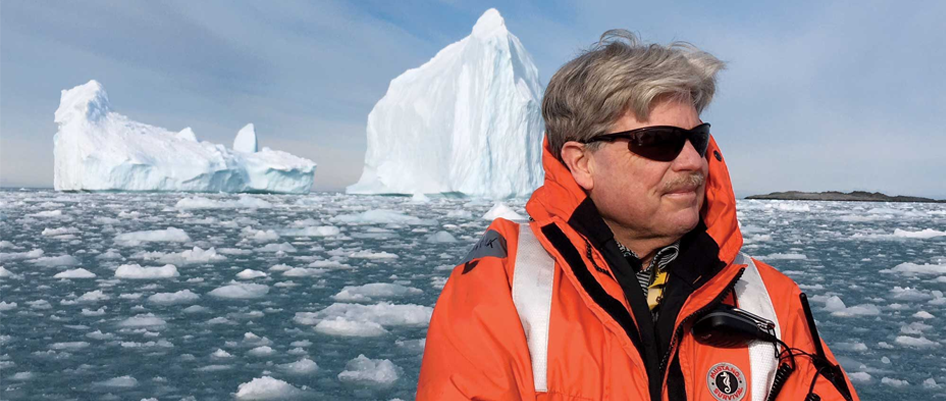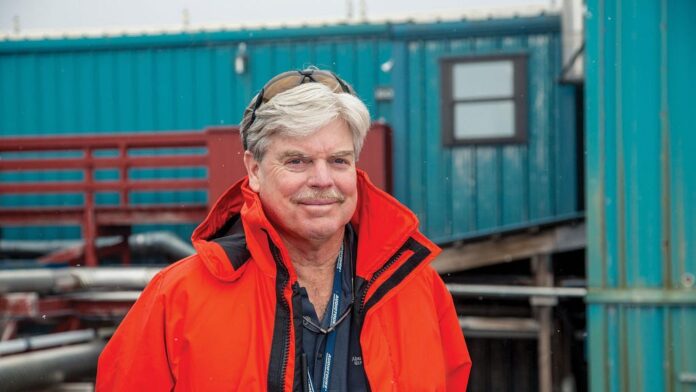Dr James McClintock Of Abercrombie & Kent: 5 Things We Must Do To Inspire The Next Generation About Sustainability And The Environment
An Interview With Martita Mestey
Parents may help ensure their children grow up reading about the values of a healthy and sustainable planet. My wife and I emphasized nature books designed for young readers. We had to take away flashlights used to secretly read books well past bedtime.
As a part of my series about what we must do to inspire the next generation about sustainability and the environment,I had the pleasure of interviewing Dr. James McClintock.
Dr. James B. McClintock is an Endowed University Professor at the University of Alabama at Birmingham who studies Antarctic marine biology. His research focuses on marine invertebrate nutrition, reproduction, Antarctic marine chemical ecology, and the impacts of climate change and ocean acidification. He has authored over 300 scientific publications and two popular books and has received numerous awards for his Antarctic research and science communication work.
Thank you so much for doing this with us! Our readers would love to “get to know you” a bit more. Can you tell us a bit about how you grew up?
I grew up on the California coast in Santa Barbara — hiking, tide pooling, fishing, and surfing — in a family that enjoyed hiking and camping in the sierras. I fell in love with nature photography and English literature in high school.
Was there an “aha moment” or a specific trigger that made you decide you wanted to become a scientist or environmental leader? Can you share that story with us?
I attended the University of California at Santa Cruz and as a first-year student took a course in Marine Biology. The gifted professor, Dr. John Pearse, sensed my interests in nature and adopted me as an undergraduate research student. I quickly changed my major from English to Biology with a focus on Environmental Biology, Conservation, and Natural History. My story is a classic tale of a key, early mentorship influencing an entire career.
Is there a lesson you can take out of your own story that can exemplify what can inspire a young person to become an environmental leader?
I would encourage young people to never underestimate the power of mentoring relationships. Set aside your fears and approach an environmental leader, introduce yourself, offer to work in a mentorship position, even if without pay or course credit. These relationships/connections can pay huge dividends and fast track a career in environmental science. Combined with your perseverance you will ultimately significantly increase your odds of becoming an environmental leader.
Can you tell our readers about the initiatives that you or your company are taking to address climate change or sustainability? Can you give an example for each?
I am about to embark on Abercrombie & Kent’s Antarctica Cruise Adventure where I will share adventures from 40 years of research in polar waters and discuss my studies over the past two decades on climate change, ocean acidification, and chemical ecology and drug discovery. My research team’s studies of Antarctic marine seaweeds and invertebrates has yielded novel chemical compounds with the potential to fight diseases such as cancer, the H1N1 flu virus, and antibiotic-resistant bacterial pathogens.
For the past 15 years, Abercrombie & Kent Philanthropy has made a donation on behalf of every guest on this cruise, funds which are used to purchase equipment needed by researchers studying the impacts of Antarctic climate change. This included instruments to measure underwater chlorophyll, ocean currents, seawater chemistry, temperature, and salinity. We also installed a penguin cam that broadcasts real-time images of Adélie penguins nesting on Torgersen Island from November through March each year. This penguin species is being closely studied by scientists as Adélie are an important indicator species of climate change. The most recent AKP gift was a set of five satellite tags designed for penguins. These satellite tags have already provided information about the foraging patterns of Gentoo penguins, a species that is extending its range down the Antarctic peninsula as a result of rapid climate warming. This coming expedition cruise (December 2023) we will continue a seabirds and climate change theme with a gift of six satellite tags for giant petrels.
Can you share 3 lifestyle tweaks that the general public can do to be more sustainable or help address the climate change challenge?
1. Vote (this is by far your most powerful means of addressing climate change).
2. Talk to family and friends about climate change (Americans do not talk enough about this key issue).
3. Become an advocate for something in the sustainability genre that is dear to your heart (e.g., plastic recycling, insulating homes, solar or wind energy, etc.).

Ok, thank you for all that. Here is the main question of our interview: The youth-led climate strikes of September 2019 showed an impressive degree of activism and initiative by young people on behalf of climate change. This was great, and there is still plenty that needs to be done. In your opinion, what are 5 things parents should do to inspire the next generation to become engaged in sustainability and the environmental movement? Please give a story or an example for each.
1. — Parents may encourage their children in middle school and high school to join a student sustainability club or something similar. Each year i visit these student organizations across Alabama to speak about my work in Antarctica. The students are ‘super charged’ about the issues.
2. — Parents may help ensure their children grow up reading about the values of a healthy and sustainable planet. My wife and I emphasized nature books designed for young readers. We had to take away flashlights used to secretly read books well past bedtime.
3. — Parents can include books among reading lists authored by the famous naturalists that write about science for a public audience — Rachel Carson, e.g. Wilson. Sylvia Earle, etc. My wife and I found that high school ages were a good time to do so.
4. — Some parents can provide their children with the opportunity to travel as a family and experience other cultures. Many of these cultures are ahead of the United States in addressing sustainability and climate change (a teaching moment). Due to my profession as a professor, I was able to take my family on my research sabbaticals to New Zealand, Bermuda, and even on an Antarctica cruise.
5. — Parents should provide hope when discussing climate change with their children. This will encourage them to ‘make a difference.’ Give them the ammunition to make this difference, but I would advise note to force them into specific activities or career. Both of my children, with no pressure from mom and dad, sought out sustainability-related careers on their own. One is now a physicist working on new materials to produce solar energy, the other is an environmental lawyer that works for a non-profit firm focused on addressing pressing environmental issues in the southern united states.
How would you articulate how a business can become more profitable by being more sustainable and more environmentally conscious? Can you share a story or example?
My story is centered around a recent sustainability conference I was invited to participate in at the corporate headquarters and production facility of Mercedes Benz in Alabama. The CEO of Mercedes began the conference by explaining to the 100 attendees with passion that the very future of Mercedes as a successful global corporation now depended on a deep focus on sustainability. They emphasized that no longer will ‘green window dressing’ suffice, but rather sustainability must be in the meat of a company. Case in point, Mercedes has built both on site and off site solar for its vehicle and battery production plant in Alabama (a state with ample sun for solar) that provides all the necessary electrical energy. The entire plant is designed to soon be carbon free. As a university professor I am encouraging educational entities to follow suit.
None of us are able to achieve success without some help along the way. Is there a particular person who you are grateful towards who helped get you to where you are? Can you share a story about that?
As mentioned earlier, Professor John Pearse, who passed away recently was one of my key mentors in life. He paved a path for me to graduate school in Florida, where another of my mentors, professor John Lawrence, offered me the opportunity to travel with him on my first research expedition to Antarctica. The rest is history: in two weeks, I depart for my 32nd trip to Antarctica. In this instance, helping lead a climate change themed A&K cruise to the Antarctic peninsula.
You are a person of great influence and doing some great things for the world! If you could inspire a movement that would bring the greatest amount of good to the greatest amount of people, what would that be? You never know what your idea can trigger. 🙂
There is great potential to galvanize faith communities in America (and the world more largely) to adopt leadership roles in addressing human-caused climate change. After all, care of creation (whatever that may be to each of us) is an issue that is woven into the very fabric of theology. What could be more closely aligned with addressing anthropogenic climate change than caring for the well-being of a challenged planet? Humanity is in need of healing, messaging, and bold acts. What is hopeful is that these ‘bold acts’ are in our technical tool kit. We just need the will — both spiritual and not — to make them happen. When I speak with young people today, I am often encouraged by a ‘can do’ spirit that embraces bold acts. There is indeed hope.
Do you have a favorite life lesson quote? Can you tell us how that was relevant to you in your own life?
I am fond of a quote from my good friend E.O. Wilson who recently passed away. It goes: “Nature holds the key to our aesthetic, intellectual, cognitive and even spiritual satisfaction.”
What is the best way for people to continue to follow your work online?
You can find my works at: James B. Mcclintock — CAS — Department of Biology (uab.edu).
I have also authored two successful books you may find of interest — Lost Antarctica Lost Antarctica: Adventures in… By mcclintock, James (amazon.com) and A Naturalist Goes Fishing A Naturalist Goes Fishing: Casting… By mcclintock, James (amazon.com).
I encourage individuals interested in joining me on my annual A&K Antarctica expedition cruise each December 7–22 to contact A&K travel.
This was so inspiring. Thank you so much for joining us!
Dr James McClintock Of Abercrombie & Kent: 5 Things We Must Do To Inspire The Next Generation About… was originally published in Authority Magazine on Medium, where people are continuing the conversation by highlighting and responding to this story.


